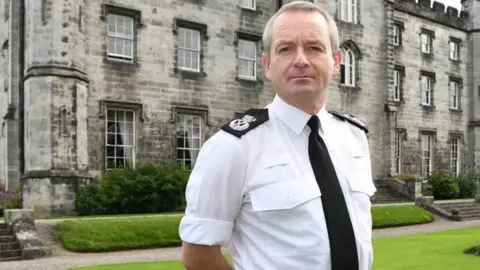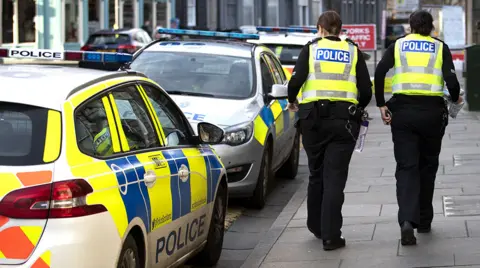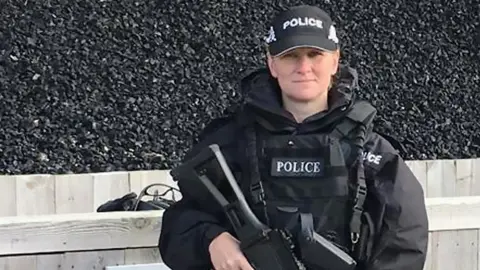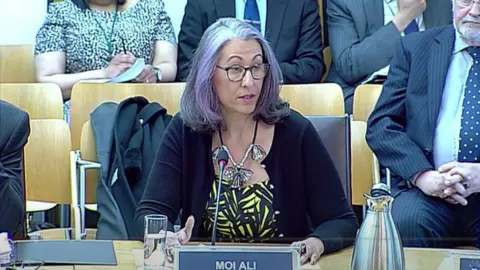Police Scotland officers offended at chief's racism remarks
Police in Scotland have said their job will be made "more difficult" by the chief constable saying the force is institutionally discriminatory.
Sir Iain Livingstone stressed he did not mean individual officers and staff were racist or sexist.
David Threadgold of the Scottish Police Federation, which represents officers, said police had been "deeply offended".
He said members of the public would not distinguish between institutional problems and individual officers.
Sir Iain made the remarks on Thursday as he delivered a report to the Scottish Police Authority (SPA) board. It was believed to be the first statement of its kind by a police chief.
He said: "It is the right thing for me to do, as chief constable, to clearly state that institutional racism, sexism, misogyny and discrimination exist.
"Police Scotland is institutionally racist and discriminatory."
It came after a review uncovered first-hand accounts of racism, sexism and homophobia by serving officers.
The independent review group urged the force to be alert to "backlash" against efforts to improve matters, and particularly to be aware of "all lives matter" views.
First Minister Humza Yousaf said that, as a person of colour, the admission of was "monumental" and "historic", while chair of the Scottish Police Authority board Martyn Evans called it a "watershed moment".
However Mr Threadgold said the reaction had been "overwhelmingly negative" among officers.
 Police Scotland
Police ScotlandInitially speaking to the BBC's Newsnight, he said: "The use of the phrase institutionally racist is one that has deeply offended and upset them and they do not recognise themselves in that way.
"That nuance in the delivery of the message was missed absolutely and there is real potential that that has damaged the relationship between the chief constable and those who represent the communities in Scotland."
Sir William Macpherson's definition of institutional racism, set out in his 1999 report into the killing of black teenager Stephen Lawrence, is the collective failure of an organisation to provide an appropriate and professional service to people because of their colour, culture, or ethnic origin.
It can include processes, attitudes and behaviour which amount to discrimination through unwitting prejudice, ignorance, thoughtlessness and racist stereotyping.
However Mr Threadgold told BBC Radio's Good Morning Scotland that the vast majority of officers perceived the chief constable was "labelling them as institutionally racist".
As a result, he said he believed the job of police officers had been made more difficult by Sir Iain's comments.
He said: "The reason for that is they [the public] will hear him speaking and they will also not make that distinction.
"So when they [officers] are out patrolling in the streets around Scotland this weekend, members of the public will see them, they will make the link to the fact that the chief constable has said that we as an organisation are institutionally racist and that will make our job more difficult."
Asked whether the force's priority should be the individuals who experience racist or sexist behaviour, Mr Threadgold said: "It should be as equal a priority as everything else."
 PA Media
PA MediaBoth Mr Threadgold and Sir Iain accepted there are examples of officers in the force who are discriminatory.
The chief constable also told the BBC he "totally accepted" how institutional discrimination could be conflated with individuals.
However he said: "This is separate matter, this is about policies, practice, systems that have at times unintended or unforeseen consequences that actually discriminate against certain groups.
"I think it's important to state it as a fact so that we can make progress and make policing and Scotland a better place."
'Utter nonsense'
Police Scotland has faced a number of concerns about its culture in recent years.
Some women who are former officers spoke to the BBC's Newsnight about a "boys club" culture at all levels of Police Scotland.
One of them, former firearms officer Rhona Malone, won almost £1m in compensation from the force after an employment tribunal found she had been victimised when she had raised concerns about sexism.

The force is also under pressure due to an ongoing public inquiry into the death of Sheku Bayoh, who was restrained by police officers in Kirkcaldy.
The inquiry is investigating the circumstances of the 31-year-old's death and whether race was a factor.
Human rights lawyer Aamer Anwar represents Mr Bayoh's family and spoke to the BBC after the inquiry heard evidence from a former officer involved in the restraint who denied making racist remarks.
In response to Mr Threadgold's comments, he said the federation was "in denial" and should be considering the morale of black, Asian and female officers who had faced discrimination.
He said: "It's absolute and utter nonsense. On which occasion have they stood up publicly and robustly defended officers who have been the victim of racist discrimination, of racism?
"When have they defended those female officers who have been subjected to horrific misogyny? Some officers who we are dealing with at the moment have allegations of sexual violence - where is their defence of those officers?
"They need to change, they need to get on board and if they're not willing to accept those changes then they need to leave the police service."
Sir Iain has held the position of chief constable for six years and is to retire on 10 August.
Moi Ali, who was formerly on the SPA board but quit amid a row over meetings being held behind closed doors, said it had taken too long for him to raise the issue of institutional racism in the first place.

She told Good Morning Scotland: "MacPherson talked about institutional racism in 1999. I'm just wondering why it took until the next century for the chief constable, within spitting distance of collecting a very handsome police pension, to mention this.
"I welcome the fact that the statement has been made, but he's about to walk out of the door and leave the problem that he was part of not solving for a decade."
Last year Police Scotland launched a four-year strategy called "Policing Together" to tackle discrimination in the force and in the community.
It recently announced a mandatory leadership programme to be rolled out to about 5,000 officers and staff to improve the existing workplace culture.
Earlier this year the force also stepped up its vetting procedures in response to the case of David Carrick, who admitted dozens of rape and sexual offences as a Met police officer.
